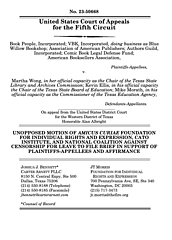Learn more about Cato’s Amicus Briefs Program.
In 2023, Texas passed the “Restricting Explicit and Adult-Designated Educational Resources” (READER) Act. The READER Act applies to any bookseller that supplies books to Texas public schools. The law would force these booksellers to rate every book they have sold or plan to sell to such a school with one of three labels: “sexually explicit,” “sexually relevant,” or “no rating.” Booksellers must submit these ratings to the Texas Education Agency, which would then post the ratings online. A bookseller that refuses to comply would be banned from selling any books to Texas public schools. The TEA may unilaterally change any submitted rating, and a bookseller that refuses to accept the TEA’s “corrected” rating on any book would likewise be banned from selling any books to Texas public schools.
A group of booksellers and organizations sued, arguing that the law violated the First Amendment among other claims. A federal district court blocked the law, finding that it likely violated the First Amendment by compelling booksellers to express ratings they may not agree with. Now the case has been appealed to the Fifth Circuit, and Cato has joined the Foundation for Individual Rights and Expression and the National Coalition Against Censorship in an amicus brief supporting the booksellers.
As our brief explains, the law is unconstitutionally vague because no bookseller can be expected to know what qualifies as “sexually explicit.” The law defines a “sexually explicit” book as one which “describes, depicts, or portrays sexual conduct” in a way that is “so offensive on its face as to affront current community standards of decency.” But each book must be given one statewide rating, which leaves booksellers at a loss as to which community’s standards to apply. The community standards of Austin may not be the same as the standards of Odessa, yet a bookseller must somehow pick one rating appropriate for every city in Texas.
Booksellers would similarly struggle to apply the standard for “sexually relevant” material. That rating is defined as applying to any book that merely “describes, depicts, or portrays sexual conduct.” But the law does not define “sexual conduct.” Should a bookseller take that definition at its most literal and apply it to any book that mentions sex, no matter the literary context? Would this definition sweep to include To Kill a Mockingbird, whose central trial concerns testimony about an alleged rape? Once again, booksellers can only guess what the law requires.
Finally, our brief notes that the law requires booksellers “to publish lists voicing value judgments they do not share about hundreds or even thousands” of books, making it a textbook case of impermissible compelled speech. Booksellers are of course free to adopt their own voluntary rating system, but the government may not compel private companies to label their products with subjective content descriptions based on a government-imposed standard. The Fifth Circuit should affirm the district court and not allow the READER Act to take effect.

This work is licensed under a Creative Commons Attribution-NonCommercial-ShareAlike 4.0 International License.


